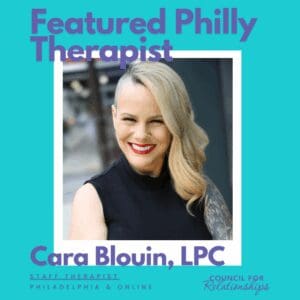Therapy for Perfectionism: Finding Freedom Beyond Achievement
Perfectionism doesn’t always look like color-coded calendars or spotless homes. Sometimes it looks like never asking for help, saying yes to everything, or feeling like rest is a reward you haven’t earned. For many, therapy for perfectionism provides space to explore these patterns with compassion. At Council for Relationships, relationships therapists like Cara Blouin, LPC, draw on humanistic therapy and person-centered therapy to help clients reconnect with their needs—and themselves.
As a person-centered therapist, Cara works with people who seem fine on the outside but feel overwhelmed or unseen on the inside. Her approach to therapy focuses on listening deeply and building trust, especially for clients who have spent years trying to be everything for everyone else. Many are helpers, caregivers, or high achievers quietly navigating burnout, resentment, or disconnection. Cara creates space for clients to feel heard, understood, and supported—without needing to perform.
What does Therapy for Perfectionism Really Address?
Therapy for perfectionism often begins with a single question: What happens if I stop holding everything together? For many people, the answer feels terrifying. That’s because perfectionism can become a shield—a way of protecting against rejection, failure, or shame.
How Therapy for Perfectionism Hides in High Standards
Perfectionism isn’t always obvious. Some people experience it as anxiety around failure, while others experience it as never being able to relax. You might find yourself:
- Saying yes to everything because saying no feels like letting people down
- Over-functioning in relationships, work, or caregiving roles
- Measuring your worth by productivity, performance, or praise
- Feeling resentful or depleted but unsure how to stop the cycle
- Thinking that your struggles “don’t count” because others have it worse
Cara often works with people who didn’t even realize they had needs. “They’ve been too busy tuning into what others need,” she says. “They themselves are not falling apart in ways that our culture seems to notice or respond to.”
Cara Blouin’s Person-centered Therapy for Perfectionism
Cara’s approach is rooted in person-centered therapy, a model that prioritizes empathy, curiosity, and unconditional positive regard. She doesn’t give advice or pass judgment—she listens, reflects, and helps clients hear themselves more clearly.
Why Person-centered Therapy Builds Trust and Insight
In the early sessions, Cara focuses on observation. “I’m trying to get a vibe,” she explains. “I want to know what it feels like to be with the person. One of the most valuable things a therapist can offer is the understanding of what it’s like to be in relationship with that client.”
This relational awareness helps Cara reflect back patterns her clients may not notice—like how often they minimize their needs, how quickly they change the subject when something feels vulnerable, or how rarely they speak with self-compassion.
“I love my clients, and I want them to exist, just as they are,” she says. “Anything that leads them to hide or change takes me away from that goal.”
How Humanistic Therapy Supports Lasting Change
Cara’s approach is grounded in humanistic therapy, a perspective that views each person as inherently worthy, capable of growth, and deserving of empathy. Unlike more directive styles of therapy, humanistic therapy begins with the belief that people already hold the answers they seek—it’s just a matter of creating the right conditions for those answers to emerge.
How Humanistic Therapy Empowers Personal Growth
In sessions with Cara, there’s no pressure to fit into a clinical checklist. Her work draws from the foundations of humanistic therapy, including presence, authenticity, and the freedom to explore emotions without judgment. Clients are invited to notice what they feel, what they avoid, and what gets in the way of being fully themselves.
“Things get better when we let go of the illusion of control, not when we cling to it,” Cara says. This idea reflects one of the core beliefs of humanistic therapy: that acceptance, not criticism, leads to transformation.
For clients who have spent years adapting to others’ expectations, humanistic therapy can feel like a relief. It creates room for self-exploration without shame—and for many, that becomes the foundation for deep and lasting change.
Whether clients are exploring therapy for perfectionism, processing spiritual questions, or facing burnout, Cara’s use of humanistic therapy helps them rediscover the parts of themselves that have been overlooked or silenced.
How a Relationships Therapist Treats Burnout from Perfectionism
Perfectionism often goes hand-in-hand with emotional exhaustion. Many of Cara’s clients are helpers: teachers, healthcare workers, parents, clergy, nonprofit leaders. These are people who are used to caring for others—and who often struggle to name what they need in return.
What a Relationships Therapist Sees Beneath Burnout
Burnout doesn’t always look like crisis. Sometimes it looks like working late every night, then crying in the car. Sometimes it looks like being unable to sleep because your mind won’t stop replaying what you could have done better. Sometimes it looks like withdrawing from relationships because you’re too tired to pretend everything’s okay.
Cara helps her clients name these quiet forms of suffering and explore what it means to care for themselves without guilt. That often means getting curious about patterns of codependency, over-identification with work, or the belief that asking for help is weakness.
“The sense of self can disappear when we’re locked into being good or doing good,” Cara says. “Seeing a real person with preferences and unique views emerge is one of the most rewarding parts of therapy for me.”
Skeptical about Therapy for Perfectionism? Start Here.
Cara has worked with many clients who were skeptical about therapy—especially those who pride themselves on being independent. She doesn’t ask people to believe in therapy. She asks them to notice whether this conversation is useful right now.
Small Wins in Person-centered Therapy
“Therapy isn’t like the gym,” Cara says. “It’s not quantifiable. Often, you don’t notice things have changed until one day when you’re delighted to notice that what you would have done in the past isn’t what you’re doing today.”
For people who feel uncertain, she encourages curiosity over commitment. You don’t need to have it all figured out before you start. You just need to be willing to show up and see what happens when someone listens deeply to your story. This is a hallmark of person-centered therapy, which emphasizes presence, reflection, and trust in the client’s innate capacity for growth.
Integrating Identity and Spirituality in Therapy for Perfectionism
Some clients carry perfectionism shaped by religion, cultural expectations, or moral pressure. Cara offers spiritual and religious counseling to clients navigating these dynamics, including people healing from religious trauma or exploring new paths of meaning.
Humanistic Therapy for Spiritual and Identity Healing
As a preacher at her Methodist church and a co-founder of West Philly Insight, Cara integrates both Christian and Buddhist perspectives when helpful to the client. She often works with people who are:
- Healing from religious trauma or purity culture
- Reconciling queer identity with spiritual beliefs
- Exploring mindfulness, self-compassion, and emotional awareness
- Seeking meaning beyond achievement or productivity
“A lot of humanistic therapy borrows heavily from Buddhism,” she explains, “particularly the idea that there is a space between what happens and how we habitually respond to it.”
That space, she believes, is where real transformation can begin.
Editor’s Note: The views expressed in this blog are those of the author and do not necessarily reflect the official policy or position of Council for Relationships.

Contact Cara to learn more about therapy and psychiatry referrals at CFR.
How a Relationships Therapist at Council for Relationships Can Help
Cara Blouin, LPC, is the Director of Clinical Operations and a Staff Therapist at Council for Relationships. With over 60 expert therapists and psychiatrists, Council for Relationships has provided specialized, integrated mental health care since 1932. Our therapists offer a range of support for individuals, couples, and families, including therapy for perfectionism, burnout, trauma, and relationship challenges.
Council for Relationships’ care model is collaborative, inclusive, and grounded in the belief that healing happens through connection. Whether you’re starting therapy for the first time or returning after time away, Council for Relationships’ team is here to help you feel seen, supported, and empowered. Get matched with an expect CFR Therapist or Psychiatrist today.
More from Council for Relationships
Looking to stay connected?
- Get matched with a Council for Relationships therapist or psychiatrist
- Sign up for our newsletter
- Browse more blogs and therapist stories

